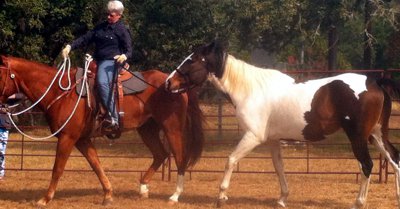Help Your Horse Beat the Heat
Horses are well-equipped to handle high temperatures and humidity if left in their natural environment. It’s only when we confine our horses that we interfere with their natural defenses, so when the weather is hot we need to pay special attention to their needs. Stalled horses need to have access to five to ten gallons of fresh clean water at all times. I prefer using five-gallon buckets or troughs rather than automatic watering systems since these systems don’t allow me to monitor a horse’s water intake. Plus, some horses like to take deep drinks rather than sip their water, and most automatic water systems force horses to sip water. Another disadvantage of automatic systems is that they don’t allow the chlorine gas to escape from treated water. Some horses dislike drinking chlorinated water and the chlorine can negatively affect the bacteria in the horse’s gut. If your horse normally drinks from an automatic water system, try hanging an extra water bucket in his stall or pen during the hot summer months and see if he drinks from it. Keep the water as cool as possible as this will help your horse cool down when he drinks and also encourage him to drink more. I have never tried adding ice to my horse’s water bucket, but I know that I personally prefer ice water in the summer.
Your horse may also need electrolytes during the summer heat. Horses keep cool by sweating and their need for salt and electrolytes is related to the amount they sweat. While horses seem to sweat more in humid weather, hot dry weather can be just as taxing to your horse’s health. Sweat evaporates quickly in low humidity, often leaving a salty residue on dry skin. Electrolytes are equally important under these conditions. It’s important to give your horse electrolyte before dehydration occurs. Salt blocks and loose salt will meet the needs of most horses at rest, but if your horse is going to be working or stressed in any way it is a good idea to give a good commercial electrolyte beforehand. For horses in training, daily electrolytes may be needed and it is better to give these in the morning feed. Avoid products that contain artificial flavors and colors. These additives are not needed and are harmful when fed on a regular basis.
Feeding pre- and probiotics daily will support the healthy bacteria in your horse’s gut and this will keep the digestive tract functioning well during hot weather. Normally I am a fan of free choice hay but during very hot weather it may be necessary to cut back on hay to decrease the heat generated by its fermentation in your horse’s gut. Cutting back on grass hay and adding a flake of alfalfa will give your horse the calories and fiber he needs without producing as much heat during digestion. Other cooling foods can be fed in moderation, including apples, watermelons, citrus fruits, barley, kelp, spirulina, blue-green algae, wheat and barley grass, dandelion greens and roots, fresh peppermint, nettles, red clover blossoms, lemon balm, and cilantro.
During hot weather it is also important to ensure that your horse has plenty of ventilation at all times. Fans and misters will help cool confined horses and pastured horses benefit from well-ventilated run-in sheds if trees are not available for shade.
Horses in training should be washed down after workouts with cool, but not cold, water. It is very important to scrape the excess water off your horse after you rinse him off because otherwise the water will act as an insulator on the skin and hold in the heat. Horses that do not sweat well should not be bathed with cool water but should instead be rubbed down with room-temperature water mixed with a liniment such as Vetrolin or Sore No More. This will clear out the pores and keep them open to allow more sweating. This practice can also help horses that are prone to heat rashes, and is especially useful if you want to avoid getting excess moisture on your horse’s hooves.
Helping your horse beat the heat so he can do his job well isn’t rocket science, it just takes a little care and attention. Putting these basic management procedures into practice can do wonders in supporting your horse’s natural adaptive capabilities for dealing with the heat.
Shop Online for “Beat the Heat” Products
Get great “beat the heat” products like Sore No More, probiotics, blue-green algae, Fastrack and more in our one-stop online shop.
About the Author
Madalyn Ward, DVM, owns Bear Creek Veterinary Clinic in Austin, Texas. She is certified in Veterinary Homeopathy and Equine Osteopathy.
Memberships include American Veterinary Medical Association, American Association of Equine Practitioners, American Holistic Veterinary Medical Association, Texas Veterinary Medical Association and the Academy of Veterinary Homeopathy.
She has authored several books and publishes at her blog.
